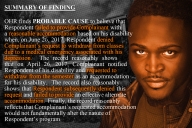You have /5 articles left.
Sign up for a free account or log in.
A California appeals court has ruled, 2 to 1, that public colleges and universities do not have a general legal obligation to protect adult students from violent acts by other students.
The ruling throws out a lawsuit against the University of California by Katherine Rosen, a former student at the University of California at Los Angeles who in 2009 was stabbed and had her throat slashed by a fellow student in a chemistry lab. The suit charged that UCLA didn't do enough to protect students, even as it learned of the serious mental health issues faced by the student who committed the stabbing. That student, Damon Thompson, who was charged in the attack, was found not guilty by reason of insanity.
The ruling is based on California and not federal law. But it comes at a time of increased public debate over the responsibilities of colleges to protect students.
Prior to the attack on Rosen, UCLA treated Thompson for symptoms indicating a schizophrenia-related disorder, including hallucinations and paranoid thinking. The suit centered on whether UCLA did enough, knowing of Thompson's conditions, to protect Rosen.
But the appeals court focused instead on prior legal rulings suggesting that while public elementary and secondary schools assume an obligation under California law to protect their students, public colleges and universities do not. The court noted that attendance at college is not required.
"We find no basis to depart from the settled rule that institutions of higher education have no duty to their adult students to protect them against the criminal acts of third persons," the appeals court decision said. "The conduct at issue here -- a violent crime perpetrated by an individual suffering from mental illness -- is a societal problem not limited to the college setting."
Further, the court ruled that it wasn't relevant whether UCLA might have known that an attack was possible or even likely.
"While colleges and universities may properly adopt policies and provide student services that reduce the likelihood such incidents will occur on their campuses, they are not liable for the criminal wrongdoing of mentally ill third parties, regardless of whether such conduct might be in some sense foreseeable."
And the decision went on -- in a footnote -- to say that holding colleges responsible for such attacks might have negative consequences.
"The consequences of imposing such a duty on institutions of higher learning are difficult to predict," the footnote said. "Some schools might attempt to shield themselves from liability by reducing or eliminating mental health services, thereby increasing the overall risks to the student community. Other schools might chose to compel their students, particularly those with mental disabilities, to participate in a wider range of mental health services, thereby intruding on the privacy and freedoms associated with the modern college experience. A college or university’s task in addressing these issues would be further complicated by various statutes that prohibit discrimination based on disabilities, including mental illness."
Rosen also argued that UCLA had an obligation, as a landowner, to protect her from attacks when she was effectively a business consumer of UCLA's. But the appeals court said that California courts have exempted public institutions from such obligations.
The dissenting judge, however, found that there may be legal reasons to hold UCLA responsible for what happened to Rosen.
The dissent opens by noting what UCLA has said about campus safety.
“‘Welcome to one of the most secure campuses in the country,’ proclaims the brochure entitled ‘The Necessities for Bruin Families,’ addressed to parents who are thinking about sending their children to UCLA,” the dissent said. “Other promotional materials assure prospective students and their families that ‘UCLA is committed to maintaining a safe and respectful learning environment and takes an unwavering stand against any act that violates the True Bruin values.’”
The dissent goes on to say that such statements are typical of what colleges and universities nationally say about public safety. And in certain circumstances, the dissent said, students on a public college campus may be entitled to a special consideration for their safety, even if they are adults.
Speaking of the brochures and other materials on safety, the dissent said: "Are these sentiments simply aspirational or is the relationship between UCLA -- or any other college or university -- and its students sufficiently 'special' that the school and its personnel have an affirmative duty to adopt reasonable procedures to protect their students from foreseeable injury at the hands of third parties acting negligently or intentionally and to implement those measures with reasonable care? … I would find such a special relationship exists between a college and its enrolled students, at least when the student is in a classroom under the direct supervision of an instructor, and the school has a duty to take reasonable steps to keep its classrooms safe from foreseeable threats of violence."
The dissent noted that California courts have cited the decline of in loco parentis to justify treating college students as independent and legally responsible for protecting themselves. And the dissent noted that, in some cases, such as events on athletic fields, public colleges have been held responsible for protecting students.
"We do not need to return to the era of curfews, bed checks, dormitory searches, hall monitors and chaperons … to identify certain core functions of a college or university where a special relationship with students still exists and where the school and its personnel, because of their students’ dependence on them, have an affirmative duty to adopt and implement reasonable procedures to warn students or protect them from foreseeable third-party misconduct," the dissent said. "That is, the absence of a general duty to their students to ensure their welfare does not mean colleges and universities never have a duty to do so. And if such an affirmative duty exists on the ball field where students are participating in school-sponsored intercollegiate athletics, surely it must also be present to some degree when a student is in her classroom or laboratory engaging in regular course work under the active supervision of a professor or teaching assistant."
A lawyer for Rosen told The Los Angeles Times that an appeal was planned to the California Supreme Court. "Who is going to protect students if the school doesn't?" he said.








